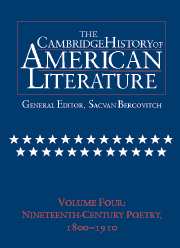3 - Transcendentalism
from AMERICAN VERSE TRADITIONS, 1800–1855
Published online by Cambridge University Press: 28 March 2008
Summary
American poets who were born during the first two decades of the nineteenth century differ in certain ways from their slightly older compatriots, though they still had to earn their living in some other way than writing verse. The provincial backwardness of earlier decades began to dissipate; poetry published in the 1830s and 1840s increasingly showed the influence of Wordsworth and Tennyson as well as that of Thomson, Cowper, and Burns. If American poets were finally beginning to discover the writings of living English poets, they were also engaged in an earnest recovery of seventeenth-century English writing, which seemed to them to possess a vigor and morning freshness that later English writing had lost. The seventeenth-century poets were valuable both as models of style and character to American writers who felt out of place in a society devoted to money-making and untroubled by any consciousness of higher truths. Oliver Wendell Holmes called Emerson's 1837 Phi Beta Kappa Address at Harvard “America's declaration of literary independence.” But Emerson's Address also contains this estimate of contemporary American society: “Public and private avarice make the air we breathe thick and fat. The scholar is decent, indolent, complaisant. See already the tragic consequence. The mind of this country taught to aim at low objects, eats upon itself.” (Contemporary British society was little better, as Americans learned from reading Carlyle.) The young writers of New England turned to the English seventeenth century for better sources of inspiration. Emerson's favorites were Herbert, Milton, and Bacon, but he took pride in having introduced Margaret Fuller to a host of other seventeenth-century writers as well: Chapman, John Ford, Beaumont and Fletcher, and Sir Thomas Browne.
- Type
- Chapter
- Information
- The Cambridge History of American Literature , pp. 87 - 136Publisher: Cambridge University PressPrint publication year: 2004



